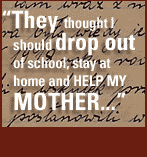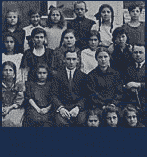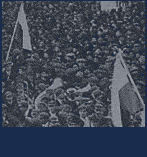

Press
Naturally, the bullhorn through which Odessa's many political groups broadcast their views was the active Jewish press, a forum that was vocally anti-pogromist and adamant about Jewish defense. Russian-Jewish newspapers of the 1860s gave rise to a new, radicalized and militant tone. The first and foremost of these was Razsvet, a lively journal edited by the heroic Osip Rabinovich (1817-1869), in which he ceaselessly championed equal rights for Jews. Somewhat less bold, but also making use of a radical tone, were Ha-Melitz (The Advisor) published in Hebrew, and Kol Mevasser (The Announcer) which was published in Yiddish by secular movements of the 1860s. By the turn-of-the-century, as Zionism and a Jewish cultural revival gained profound momentum, the numbers of literary forums quickly rose, giving birth to the new publications Kavveret (Beehive), Pardes (Orchard), and Ha-Olam (The World).
Writers
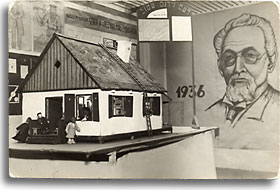

Perhaps Odessa's greatest legacy to Jewish culture was its remarkable literary scene, featuring a list of major writers that reads like a "Who's Who" of the era's Jewish intellectuals: Saul Tchernichowsky, Isaac Babel, Simon Frug, David Frischmann, Moses Leib Lilienblum, Mendel Mokher Seforim, and Chaim Nachman Bialik, among many others. They wrote in Russian, Yiddish, Hebrew, and German; they passionately grappled with the issues of the day such as Jewish identity and emancipation, Zionism, Russian culture, and contemporary politics.
Among the most important authors who wrote in Hebrew and Yiddish, but eventually contributed to the great development of the Yiddish belle lettres, was Mendele Moikher Sforim (born Sholem Ya'akov Abramovitz, 1835-1917). Known as "Der Zeide" (the grandfather) of Yiddish literature, Sforim wrote pioneering novels in Yiddish - including Dos Vintshfingerl (The Magic Ring), Di Kliatshe (The Mare), and Dos Kleyne Mentshele (The Little Man) - beginning in the 1860s, when the Yiddish language was still considered by many to be a "dialect" unequal to Hebrew, German, or Russian. Reflecting afterwards on his early embrace of Yiddish, Mendele wrote:
"I tried to compose a story in simple Hebrew, ground in the spirit and life of our people at the time. At that time, then, my thinking went along these lines: Observing how my people live, I want to write stories for them in our sacred language, yet most do not understand the language. They speak Yiddish. What good does the writer's work and thought serve him, if they are of no use to his people? For whom was I working?"
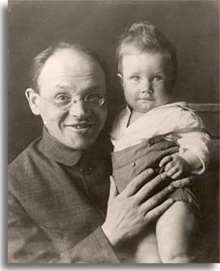

One of Odessa's most celebrated Jewish authors, Isaac Babel (1894-1940, although not a Yiddish writer was among the first Jews to write in Russian.). He first became famous for his Odessa Stories in 1923, a widely popular work chronicling the crime and vice-ridden streets of Moldavanska, the Odessa Jewish slum. Three years later, Babel wrote Red Cavalry, a rare document recounting the 1920 Red Army campaign into Poland.













